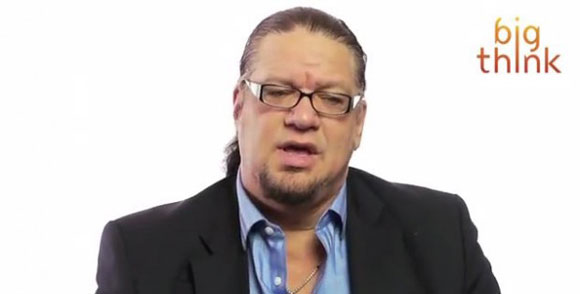penn jillette: “i do well with proselytizing, hardcore fundamentalists”

why am i blogging about penn jillette? moreover than that, why am i blogging about penn jillette again?
well, it’s not because i’m a particularly big fan of loud, oversized illusionists. no, it’s because penn jillette is a very outspoken atheist and i find myself both regularly agreeing and disagreeing with what he has to say. often, it isn’t so much about agreeing or disagreeing, but more about just being something thought provoking.
so it is with a video i stumbled across in which the question, is religion responsible for a lot of the world’s problems? is posed. while he briefly answers this question, i was more interested in the end of his discussion in which he discussed his preference for “proselytizing, hardcore fundamentalists”. here’s the video:
so penn jillette prefers fundamentalists who will simply say, “you’re wrong”, rather than “liberal” christians who he views as condescending.
why could this be? why would one prefer a staunch, rigid theology to one that represents a more generous orthodoxy?
it might be because “winning” and “losing” is more satisfying than engaging in generative dialogue. when stark lines are drawn between opposing views, it’s easier to walk away satisfied that you’ve “won”. dialogue empowers both sides.
it might be because offers no challenge. when someone simply tells you you’re wrong, it presents no challenge to your viewpoints. if someone engages my ideas, asking questions & seeking common ground, it forces me to be self-critical and to deepen my theologies.
it might be because villianzing the other viewpoint makes us feel more like the hero. why do people typically make fun of others? it’s to mask one’s own insecurities. so when a fundamentalist clearly lays out their theology, it’s easy to label them as the villain while distracting others from our own flaws.
more than anything, though, it might be because penn jillette is, himself, a fundamentalist. we’ve largely segmented the term “fundamentalist” to apply only to christianity, but the fact is that fundamentalism runs deep in a number of ideologies. more than anything, it describes an unwillingness to budge from a long accepted set of beliefs and ways of seeing the world. fundamentalism is a certainty that doesn’t leave room for generative and engaging dialogue.
so what do you think? does penn jillette offer any good points? or does his assessment of fundamentalist and liberal christians reveal more about himself than others?












